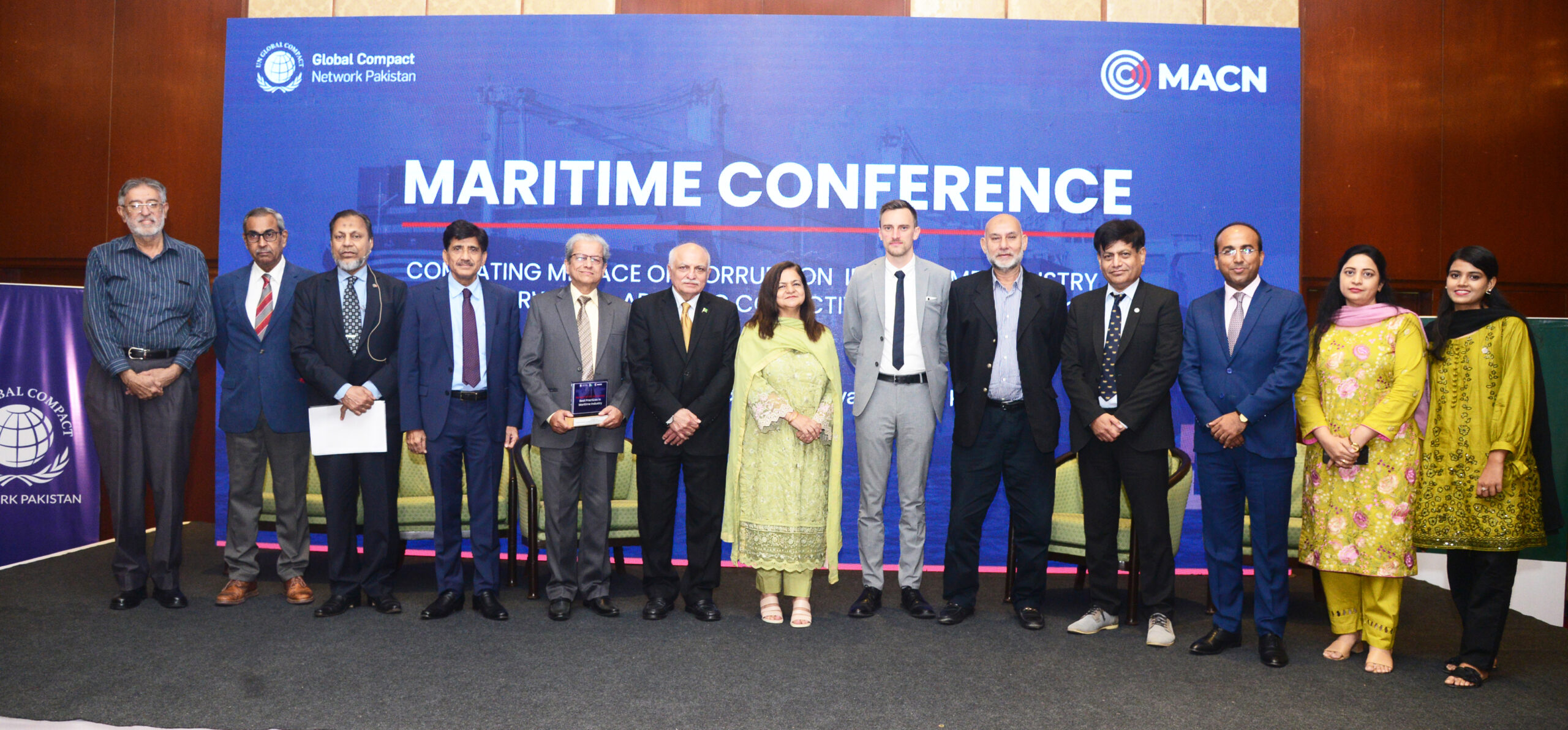Maritime Conference

Futuristic Shipping Policy being prepared ~~ Vice Admiral(R) Iftikhar Rao
Vice Admiral (R) Iftikhar Rao, Special Assistant to Prime Minister for Maritime, disclosed that the government is shaping a futuristic Shipping Policy keeping in view the new dynamics of the Maritime Sector. The Policy would address all aspects that would lead to a pragmatic outlook and enable all stakeholders to participate with more determination. He added that Maritime Economic Security is also crucial although it is different from Maritime Naval Security. Therefore, it is imperative that Maritime Economic Security and Maritime Military Security given equal importance. He was presenting his keynote address as Chief Guest at the Maritime Conference hosted by Global Compact Network Pakistan and Maritime Anti-Corruption Network based in Denmark.
Admiral Rao further stated that Pakistan pays over $7 billion each year to foreign shipping lines and this is a huge burden on the country’s foreign exchange reserves. He said that until 1960, Pakistan had no state-owned shipping company and now has only PNSC. He advised the private sector to enter the shipping sector since the future is very profitable in shipping. He also advised that the private sector should become major players in the Blue Economy. In his opinion, those who are in the Maritime Industry are very fortunate and progressive. He said that, unfortunately, information is lacking about Maritime Industry and Blue Economy and hence the transformation and change are very slow and that is why private sector is not eager to invest. However, the good side is that the private sector is always pragmatic and practical and that is why he is very optimistic.
Admiral Rao added that there would be a mega shortage of seafarers since demand for trained human resources would hugely increase. Therefore, it is imperative that the graduates of Pakistan Marine Academy be provided practical training on foreign ships through arrangement with the owners of these shipping lines. He also asked the private sector to provide ways and means to train the cadets who, as seafarers, could be employed at international level on foreign ships and earn foreign exchange for the country. He said that in the first instance, atleast 100 seafarers should be annually accommodated and the government is in contact with the shipping lines for their support.
Majyd Aziz, President GCNP, in his welcome address, said that GCNP and MACN are focused on initiating fundamental change in the Maritime ecosystem through sensitizing, informing, and training stakeholders to substantially eradicate corrupt practices. He said that three major conferences alongwith many consultative meetings, individual sessions, webinars etc have been undertaken. He said he is pleased to report that all stakeholders and users of ports have unanimously joined the bandwagon and have pledged to achieve the objective of zero tolerance for corruption. He said the menace of corruption has tarnished the global image of Pakistan and at the same time increased the cost of doing business. Moreover, corruption is now institutionalized, and it is high time that exemplary punishment is given to those whose corrupt practices are well known, as this would introduce deterrence for others who indulge in corrupt or bad practices. He proposed that Blue Economy should also be a priority in the Special Investment Facilitation Council domain since focus on indigenous resources must be encouraged rather than too much dependence on imported inputs. He also said that GCNP is working on an App so that members could access this for any issues faced by them. He suggested that this App should be linked to PSW so that fast track remedy could be provided.
Ms Alia Shahid, Director General Ports & Shipping, in her speech stated that she has been involved with this project from day one, and is pleased that momentum has been created to achieve the objectives. She added that any new project generally seems impossible but if it doable and feasible, then everyone must join to make it successful. She said that in her opinion, the path is becoming clearer and this is a great opportunity to move forward. She complimented GCNP and MACN and offered full support of her organization.
Mathias Bak, Associate from MACN, in his presentation said that now it is time to undertake a collective action by all stakeholders. Collective action is a process in which stakeholders coordinate to jointly address shared challenges and create a critical mass in order to forge ahead with unity and sincerity of purpose. He disclosed that such efforts have been successful in Nigeria, India, and Argentina where the positive rate was nearly 100%. He outlined five stages of the collective action lifecycle that are essential. He enumerated these as mapping and alliances building, scoping, inception, implementation, and continuous adaptation. He said that the project in Pakistan is at inception stage and with the full support of stakeholders, it would not take long to reach the implementation stage. He said MACN is committed to achieve this in Pakistan.
Adnan Rafiq, Domain Officer of Pakistan Single Window, in his presentation stated that 80% of global trade compliances are now covered under PSW, and over 67,000 users have subscribed in PSW. He disclosed that Pakistan is paying $450 million additional cost in complying with regulations related to imports but with PSW, the financial cost, time, and complications are substantially reduced, resulting in huge savings of foreign exchange.
Project Manager Muhammad Akram moderated a very informative panel discussion. The panelists Kamran Farid, President Stevedores Conference, Kashif Ali, Executive Director Transparency International, Capt Muqadas Sharif, representing Ship Agents, and Commander Idrees of Bahria University offered their views on how collective action could be structured and sustained among maritime industry stakeholders to minimize corruption in the handling of cargo and operations within ports, and what role could regulatory frameworks and industry guidelines play in fostering a culture of integrity and transparency within the maritime industry. Advisor of the project, Tanvir Ahmad offered the concluding remarks and vote of thanks while GCNP Executive Director, Khalid Junejo, organized and coordinated the event.
